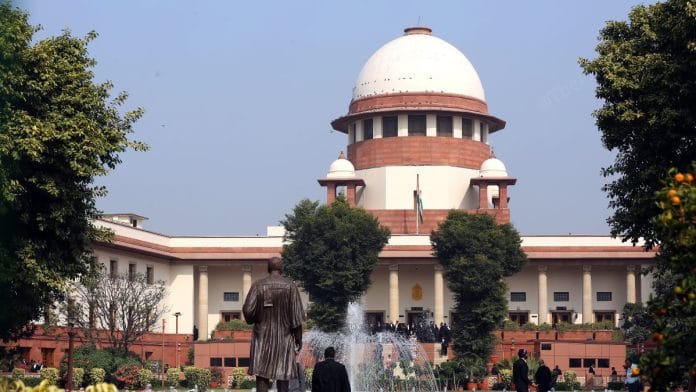New Delhi: Justices B.V. Nagarathna and Sudhanshu Dhulia—the two judges who dissented from their seven colleagues Tuesday to hold that all private resources would fall within the scope of “material resources of community” under Article 39(b) of the Constitution—took strong exception to the “harsh criticism” made against Justice V.R. Krishna Iyer in the majority opinion.
Justices Nagarathna and Dhulia were part of the nine-judge bench which held not all privately-owned resources would fall within the ambit of the phrase “material resources” mentioned in Article 39(b) and, consequently, cannot be taken over by the state in the interests of the “common good”.
Article 39(b) is part of the Directive Principles of State Policy (DPSP), which is mentioned in Part IV of the Constitution, and states “the State shall, in particular, direct its policy towards securing that the ownership and control of the material resources of the community are so distributed as best to subserve the common good”.
Like all directive principles, Article 39(b) is not justiciable or enforceable, but can be the basis for government’s policy formulation.
Headed by Chief Justice of India (CJI) D.Y. Chandrachud, the bench, by 8:1 majority, delivered the ruling on what constitutes “material resources of community”. The CJI authored the majority verdict on behalf of justices Hrishikesh Roy, J.B. Pardiwala, Manoj Misra, Rajesh Bindal, Satish Chandra Sharma and Augustine George Masih.
Meanwhile, justices Nagarathna and Dhulia authored their respective divergent views.
The majority opinion overruled a 1978 opinion of Justice Iyer in State of Karnataka And Anr Etc vs Shri Ranganatha Reddy And Anr, wherein he said material resources of the community would include both natural and man-made, publicly- and privately-owned resources. A 1983 judgment, reiterating Justice Iyer’s definition of “material resources”, was also set aside by Tuesday’s decision.
While Justice Iyer was in the minority when he penned his view in 1978, the 1983 judgment by a five-judge bench adopted his view on “material resources”.
Tuesday’s judgment said Justice Iyer’s interpretation of the phrase amounted to endorsing a particular economic ideology and was “influenced by a particular school of economic thought”, adding it was evident from “various observations made in these judgements”.
Also Read: DY Chandrachud ceded control to the govt. It took over judicial appointment process
Justices Nagarathna & Dhulia oppose ‘harsh’ criticism
In her opinion, Justice Nagarathna took objection to the specific observation made on Justice Iyer’s ideology. Quoting a particular paragraph from the majority opinion, Justice Nagarathna said in her dissenting judgment that the observations were unwarranted, and expressed her reservations against the following paragraph.
“…the role of this Court is not to lay down economic policy, but to facilitate this intent of the framers to lay down the foundation for an “economic democracy”. The Krishna Iyer doctrine does a disservice to the broad and flexible spirit of the Constitution.”
However, on reading the majority opinion, which ThePrint has accessed, the sentence using the word “disservice” could not be found. Sentences preceding the one Justice Nagarathna found objectionable are mentioned in paragraph 182 of the verdict.
Justice Nagarathna said the broad interpretation of Justice Iyer’s opinion must be seen in the backdrop of constitutional culture that prevailed then, expressing concern about whether former judges could be castigated for rendering a particular outcome.
“I say that the institution of the Supreme Court of India is greater than individual judges, who are only a part of it at different stages of history of this great Country! Therefore, I do not concur with the observations of the learned Chief Justice in the proposed judgment,” she wrote, calling the remarks against Justice Iyer “unjustified”.
She added that “merely because of the paradigm shift in the economic policies of the State to globalisation and liberalisation and privatisation, compendiously called the ‘Reforms of 1991’, which continue to do so till date, cannot result in branding the judges of this Court of the yesteryears as doing a disservice to the Constitution”.
Endorsing the views of justices Iyer and Reddy, Justice Dhulia, too, recorded his “strong disapproval” of criticism of Justice Iyer, terming it “harsh” and “avoidable”.
“The Krishna Iyer Doctrine, or for that matter the O. Chinnappa Reddy Doctrine, is familiar to all who have anything to do with law or life. It is based on strong humanist principles of fairness and equity. It is a doctrine which has illuminated our path in dark times,” he wrote.
Adding, “The long body of their judgment is not just a reflection of their perspicacious intellect but more importantly of their empathy for the people, as human being was at the centre of their judicial philosophy.”
(Edited by Radifah Kabir)
Also Read: Watch CutTheClutter: CJI Chandrachud’s judicial track record, from Article 370 to electoral bonds






